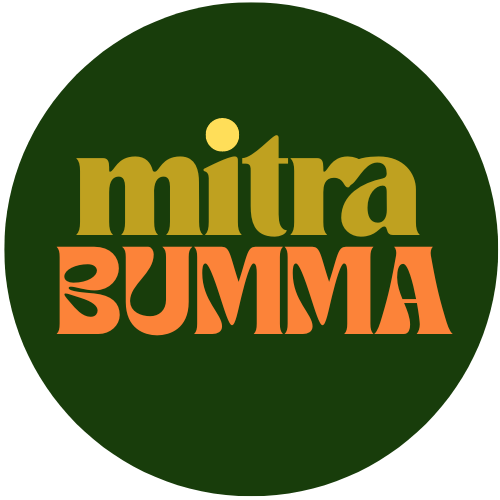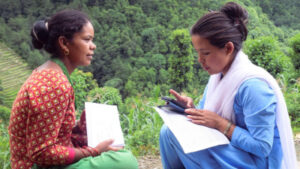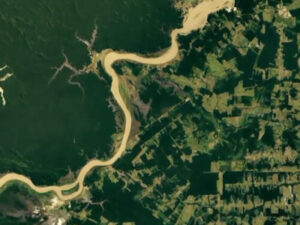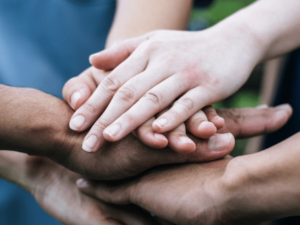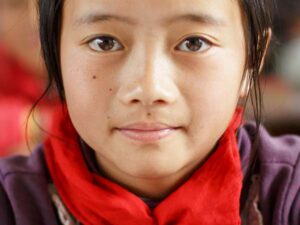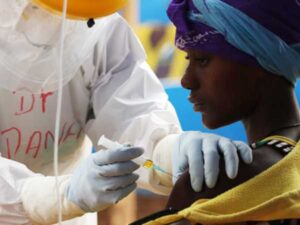Mitra BUMMA partners with indigenous tribes in Indonesia, supporting them to preserve forests and the biodiversity within them.
Ambrosius Ruwindrijarto of Mitra BUMMA and Telapak spoke with Allen Arthur on February 7, 2024. Click here to read the full conversation with insights highlighted.
Allen Arthur: Can you please introduce yourself and your organization, and describe the problem you’re working to address? What methods are you using to respond to this problem?
Ambrosius “Ruwi” Ruwindrijarto: I’m Ambrosius Ruwindrijarto. You can call me Ruwi. I’m the co-CEO of Mitra BUMMA, and co-founded Samdhana. I also co-founded Telapak. I work in the intersections of Indigenous people’s movements: local communities, tenurial rights, forests, the people’s economic development, as well as climate change, biodiversity conservation, and environmental conservation.
What we want to do is to make Indigenous people and local communities front and center in terms of mitigating climate change as well as consulting on forest and biodiversity. So much climate change money — billions of dollars — goes to organizations and consultants, including myself, at this level. Meanwhile, the actual amount of that money that goes to the Indigenous people is about 1%. That statistic is common knowledge.
We like to say good words about Indigenous people — we say we want to support them; we say they are the best at conserving forests; we even pressure them to get involved — but they’re not leading. They are not at the front and center. That’s what I want to do something about.
These Indigenous people own the land, own the forest, own the spirit. They have the spirituality, the values, and the practices. Therefore, they should be the owners of the work and initiatives. They should be the owner class while the NGOs and companies — myself included — the so-called experts and researchers should serve them. We should be the professional class that serves Indigenous people, and they should be the owners.
Mitra BUMMA means Bumma Partners. Bumma stands for the Indigenous people’s own corporation. When an Indigenous tribe, for example, establishes their corporation, they become shareholders. They own the company.
I work for them now as a consultant and provide things that they are not familiar with — like business planning, reaching out to investment, and managing a business. Those concepts are from our world, the Western world, while the world of the Indigenous people is about how to be connected and in harmony with the forest, with ancestors, and with nature, and to protect the environment. That is where the spirituality, the values, and the ownership exists. My company, Mitra BUMMA, works in partnership with them to provide all the business-centric services.
Allen Arthur: In the world of climate change and biodiversity, what makes your approach distinctive?
Ambrosius “Ruwi” Ruwindrijarto: In Indonesia, we are distinctive because we are the first ones to introduce this model through our Indigenous people’s carbon development project.
There are several companies owned by my friends in Jakarta with investors from abroad. They have companies and concessions: permits, licenses, and concessions to protect the forest. Some of them are successful in being able to protect the forest and do well socially for local communities in or around the forests; however, the communities themselve do not have ownership of these companies.
We will be different because the company is owned by the communities. We will help Indigenous people run their companies.
Allen Arthur: Can you share any examples that illustrate the impact of your work?
Ambrosius “Ruwi” Ruwindrijarto: We have two tribes that we are partnering with at the moment; both tribes have territory. Their total territory is about 100,000 hectares, and 80% to 90% of that territory is forest.
It’s a lot of work to get the whole tribe to organize themselves and come up with their governance structure for this economic work, but they’re on their way. We’ve assessed potential and are working toward finalizing the business plan. We are slowly creating a network of support — grant funders and impact investors, as well as technical providers and people with market expertise.
Allen Arthur: How do you measure your success? What’s the evidence you’re looking for that you’re making progress in this work?
Ambrosius “Ruwi” Ruwindrijarto: There are a few ways. One is measuring how many hectares of territory that they — with our support — can secure and protect. That is reflected in deforestation rates, diversity loss, and carbon storage, so there are actual metrics for that. That is on the physical and environmental side of it.
The other side is health and education. For example, we are partnering with tribes in Papua. Unfortunately, the very basic health system is not there. In that case, the metric will be the 10,000 people from these tribes to one day having their own insurance coverage and/or having a good health system in place.
Currently, Mitra BUMMA’s work has helped get health insurance for 1% of the population. In five years, we hope to increase that to 20% or 50%. That would be a very strong metric and very important metric that we want to apply. Other metrics would include economics, like job creation, income generation, etc.
We’ve taken what we call a territorial approach. We prefer this over a sectorial or commodity approach where, in the past, we might have focused our work on a single issue like climate change or forestry. Or it could be even narrower, like working on non-timber forest products, or for example, a single commodity like honey, cacao, or ratan.
A territorial orientation means we look at one territory, and within this territory consider the people, forests, spirits, and traditional culture that it encompasses. We try to be helpful or useful for everything that is there within that territory.
Now, whatever the sector, whatever the commodities, whatever the economy, our unit is the tribe and the territory. We work to improve and protect whatever is there.
Allen Arthur: Can you talk about something that you’ve tried that didn’t work, that maybe taught you a lesson about how to move forward, particularly if it’s something that you think others working in this space could learn from?
Ambrosius “Ruwi” Ruwindrijarto: What I have learned, and what I am still learning, is that doing training and workshops is not working. Capacity building is a wrong term, and often has the wrong people in the wrong place. I learned that you need to always find new approaches and be creative. Sticking to the old ways of doing work, running projects as NGOs — things I have been good at — are not making real change, or having real impact.
Allen Arthur: When you say training or workshops, do you mean for the tribes you’re working with or for other people in the organization?
Ambrosius “Ruwi” Ruwindrijarto: Generally, for the communities. As NGOs, we do a lot of training. And the trainers are always people from the capital of the country — or from New York City — and the trainees will be the local community.
It’s always a one-way transfer of knowledge, with us having ideas that we want to share with the community. That model is very common, and it exists on the business side, as well. But we believe this has to be a two-way street because we have a lot to learn from the Indigenous people and local communities.
Allen Arthur: What are the big challenges that you’ve faced or that you’re currently facing and haven’t figured out how to overcome or solve yet?
Ambrosius “Ruwi” Ruwindrijarto: We want to provide this professional service for Indigenous people. The Indigenous communities have mastered their Indigenous ways. They’ve been doing them and they’re good at them. We do the management work: the business stuff, the investment, and the financial stuff. We are good at what we do and they’re good at what they do. The challenge that I am grappling with is how we can join forces and mix in a way that will be for the best. That is the goal, but we are not there yet. The challenge is how to master what we do in a way that facilitates a collaboration that benefits everybody.
Allen Arthur: Would you say that you’re working to advance systems-level change in your field, as opposed to trying to narrowly solve a problem? What would you say is the method by which you’re doing that?
Ambrosius “Ruwi” Ruwindrijarto: I think we are working at the systems level. For example, Papua, the big island that we are focusing on right now, has 300 tribes, and the forest coverage is 32 or 33 million hectares. Right now, these 300 tribes do not have sovereignty. They do not make decisions for their own territory. It’s somebody from Jakarta or Singapore who is making decisions about what to do with this territory. This will need a landslide change, as we aim to get to a place where these 300 tribes will be the ones making decisions about this territory, and what to do with this land and this forest. I don’t know if that’s systemic, but it has to be big because the problem is big, the forests are big, and there are many tribes on that land.
Allen Arthur: It sounds like you’re using a combination of approaches to achieve that. It’s partially policy, and it’s partially partnerships across all of these fields with the Indigenous tribes. Is that accurate?
Ambrosius “Ruwi” Ruwindrijarto: I’m personally not comfortable working at the policy level. That will be somebody else. Our role is to make change from the bottom up, which will hopefully lead to a policy change because we are strong on the ground. The policymaker, like it or not, will have to follow our lead. That’s what we want to do.
Allen Arthur: What do you think is most needed from other actors in this space, whether it’s partners or policymakers or anyone else, to advance the kind of change you envision?
Ambrosius “Ruwi” Ruwindrijarto: What I want to say is be careful with what you invest in. Be careful about financial investment, of course. But even more than that, I think what is lacking is people don’t invest enough time. Time, knowledge, spirit, and solidarity are more important investments to make than financial investments. If you only have money, but you don’t have time, that can be a problem. If you have money and you want to invest in providing grants, and you pair that with investing your time and your own personal values as a non-monetary investment, I think that is [the most valuable investment you can make.]
Allen Arthur: Can you tell me more about why time, knowledge, spirit, and solidarity are at least as important as money, or maybe even more important?
Ambrosius “Ruwi” Ruwindrijarto: When an opportunity arises and it’s just money that comes, without spirit, in a place where there is no spirituality and no values, it creates trouble and problems. I think what is lacking is the genuine exchange of resources and power. There is a division between what funders or organizations have and what communities have.
Allen Arthur: How do you see the work you’re doing evolving over the next five years?
Ambrosius “Ruwi” Ruwindrijarto: This is just the beginning, and the field is huge. We want very radical change. We want the leadership to be with the people and the communities. This will be a seismic change. Over the next five years, I think I will be very busy helping people be in those leadership roles. There are so many people who are hoping they get a leading position or a set position.
Allen Arthur: What are the big insights or the big lessons that can be taken from your work that others might be able to use? If someone wanted to replicate what you did or improve on it even, what would they need to keep in mind?
Ambrosius “Ruwi” Ruwindrijarto: I think it’s about listening and trying to understand what is happening on the ground, what is happening in the community and with the community, and to follow the community’s lead.
Allen Arthur: Is there anything about this work, not just necessarily your work, but in this space in general, around Indigenous rights and climate and environment, that we didn’t cover that you feel is important to others doing this work, or others doing social change work?
Ambrosius “Ruwi” Ruwindrijarto: I think what is lacking, and what we need to spend more effort on, is culture and spirituality, and spiritual and cultural values. It’s intangible but very powerful. This is the key, the foundation of everything. I also think this is what most of us lack. We need to spend more time, more effort, and give more interest, attention, and openness to those ideals.
Allen Arthur: Can you tell me more about what happens in the work when you embrace those ideals?
Ambrosius “Ruwi” Ruwindrijarto: When we start to surrender ourselves to the power of the ancestors, the power of the spirits of the forest, all our plans, our networks, our know-how, everything is very good. We feel secure and we feel powerful. We know that we can do it when we have this blessing from the forest itself, from the ancestors themselves, and from the spirits out there. That is why I say embrace them, embrace those non-Western, or intangible, aspects of this work.
Click here to read the full conversation with insights highlighted.
Allen Arthur (he/him) is SJN’s Online Engagement Manager. He runs SJN’s social media platforms, oversees newsletters and generally seeks to inform and connect the network wherever possible. He has a master’s degree in Engagement Journalism from the Newmark Graduate School of Journalism at CUNY. He’s also a freelance journalist working with currently and formerly incarcerated people. His work (including solutions journalism!) has appeared in The Marshall Project, USA Today, YES! Magazine, Documented and elsewhere.
* This interview has been edited and condensed.
Learn about other social change organizations working with indigenous peoples.

